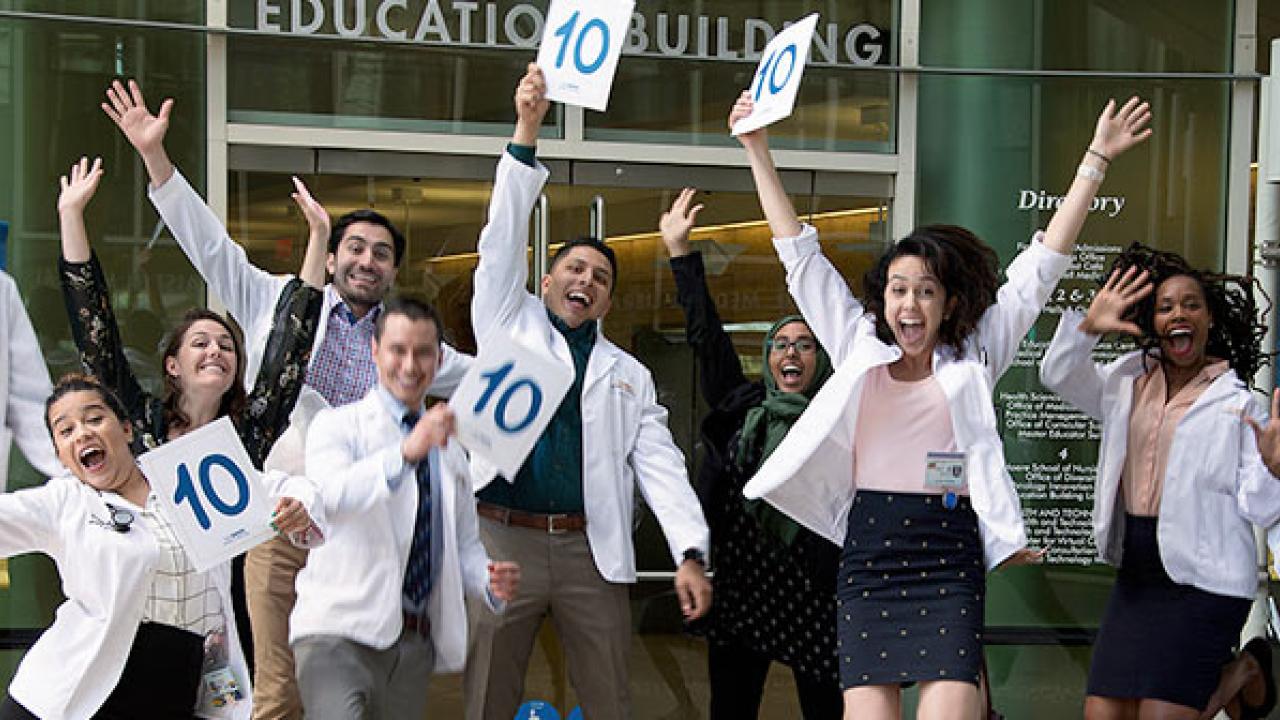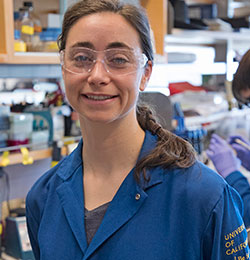
Dual Degrees Can Mean A Doubly Satisfying Career for Medical Students
M.D.-Ph.D. program offers a unique approach in medicine
Some students are drawn to careers in medicine because of a passion for science, health and the human body. Others pursue medicine because of a deep desire to improve the lives of others through quality patient care.
But what if someone wants a career that brings together both clinical care and medical research.
UC Davis does just that. It offers a unique program that enables students to earn their M.D. and Ph.D. degrees at one time.
For Nicolas Prionas, a 2014 School of Medicine graduate, UC Davis’ Physician-Scientist Training Program (PSTP) gave him the chance to work alongside renowned scientists and physicians.
He fondly recalls the benefits of working with faculty and mentors like John Boone, a pioneer in the field of imaging science, and being able to collaborate across disciplines.
Combining patient care and research
“The opportunity to combine training in clinical medicine in the School of Medicine with academic research in the College of Engineering gave me the ideal platform to bridge technological innovation and patient care,” says Nicholas Prionas. He’s currently finishing a radiation oncology residency at Stanford Medicine.
The PSTP is a unique pathway through medical school. There are less than 30 such programs in the country. Dual-degree students pay for graduate school, but their medical school tuition is covered. They also receive a stipend.
More importantly, the program offers unparalleled opportunities to gain knowledge and experience, as well as expand educational horizons, according to PSTP director Saul Schaefer. Schaefer is a professor of internal medicine with a research focus on preventing and treating heart failure.
“The thing that separates PSTP students from the Ph.D. or M.D. is the fact that they are able to live in both worlds,” says Schaefer, who’s directed the PSTP program for five years. “Their clinical care informs their research because it provides greater understanding of what the important problems are, and where the holes are in terms of our knowledge.”
Gaining additional patient care insights
Research experiences give an extra dimension to clinical care, says Schaefer. Physician-scientists may have a better appreciation for processes happening in the body. They are likely to ask more questions and more deeply analyze medical literature because it’s all part of the doctoral training process.
The UC Davis program helps physician-scientists meet the evolving scientific, social, ethical, political and humanitarian challenges facing health care.

It can take about eight years to complete the program. The first two years are spent in medical school, typically followed by four years of research to obtain a doctorate. Students then return to finish their final two years of medical school.
Benefitting from an integrated clinical program
Annica Stull-Lane is currently in her fourth year and is interested in infectious disease and caring for underserved populations. She’s working in the laboratory of Renee Tsolis as part of the Integrative Pathobiology graduate group.
“I was drawn to UC Davis for its strong integrated clinical curriculum,” says Stull-Lane. “There are robust scientific niches in translational and host-microbe interaction research. Plus, my education has been augmented by collaborative training opportunities in infectious diseases through a top-tier veterinary school."
A pathway into academic medicine
PSTP students will generally go into academic medicine, says Schaefer. They are expected to take on leadership roles in research, education and, to some degree, patient care.
The program encourages teaching skills. It also includes activities like a monthly journal club, which brings together students from the UC Davis School of Veterinary Medicine’s DVM-Ph.D. program. It gives participants a chance to teach and learn to critically evaluate scientific literature.
“I wanted both top-notch clinical training and in-depth experience conducting ambitious basic scientific research,” says fifth-year student Brendan Cohn-Sheehy. “UC Davis offered me an expansive institutional environment for both types of training.”
Cohn-Sheehy is working on his doctorate in the Dynamic Memory Lab of Charan Ranganath, a professor of psychology at the UC Davis Center for Neuroscience. Cohn-Sheehy’s research focuses on human memory and aging.
"My long-term aim is to develop clinical research programs that translate the cutting-edge of human cognitive neuroscience to direct clinical applications," adds Cohn-Sheehy. "Toward that goal, my Ph.D. work is focused on how the brain supports memories for complex, real-life events. In time, this science may pave the way for developing more successful, early diagnostics and interventions for Alzheimer's disease and other late-life neurodegenerative processes.”
A full range of training
The PSTP provides students an ideal institutional environment to pursue a full range of interdisciplinary training. The scope and strength of the university’s research capabilities underscore both learning opportunities and the increase in National Institutes of Health (NIH) grant funding.
Students recently hosted the Western regional meeting of American Physician Scientist Association. Several have also earned prestigious and highly competitive F30 awards from the NIH. It is but one metric that illustrates the overall strength of the UC Davis program. Residencies and journal articles are other indicators of excellence.
“Our students have gotten first-rate research residencies at places such as Harvard, Stanford and University of Iowa,” says Schaefer. “Plus, our students have had a number of manuscripts in high-impact, peer-reviewed publications.”
Because it is a combined program, PSTP students are expected to maintain a degree of clinical knowledge. Often they work in the UC Davis student-run clinics on weekends. They also have a one-month re-entry program following their Ph.D. During this time, students work in the departments of Physical Medicine and Rehabilitation and Internal Medicine to regain their clinical-care skills, such as how to present cases and examine patients.
Dual degrees bring unexpected benefits
Students choose UC Davis School of Medicine because of its many clinical strengths and training opportunities. Those seeking careers as physician-scientists have found UC Davis to be the ideal school to accomplish their goals.
The program and school also provide students with some unexpected benefits that can be doubly satisfying for the dual-degree participants.
“I underestimated what tight bonds are created by being in the trenches with your classmates in medical school, learning how to be a doctor and, similarly, in the lab trying to advance the frontier of science,” says Prionas. “Some of my closest friendships are from my PSTP years and the camaraderie I experienced.”
About Graduate Studies
Graduate Studies at UC Davis includes over 100 dynamic degree programs and a diverse and interactive student body from around the world. Known for our state-of-the-art research facilities, productive laboratories and progressive spirit – UC Davis offers collaborative and interdisciplinary curricula through graduate groups and designated emphasis options, bringing students and faculty of different academic disciplines together to address real-world challenges.
UC Davis graduate students and postdoctoral scholars become leaders in their fields: researchers, teachers, politicians, mentors and entrepreneurs. They go on to guide, define and impact change within our global community.
For information on Graduate Studies’ current strategic initiatives, visit the Graduate Studies strategic plan page.
